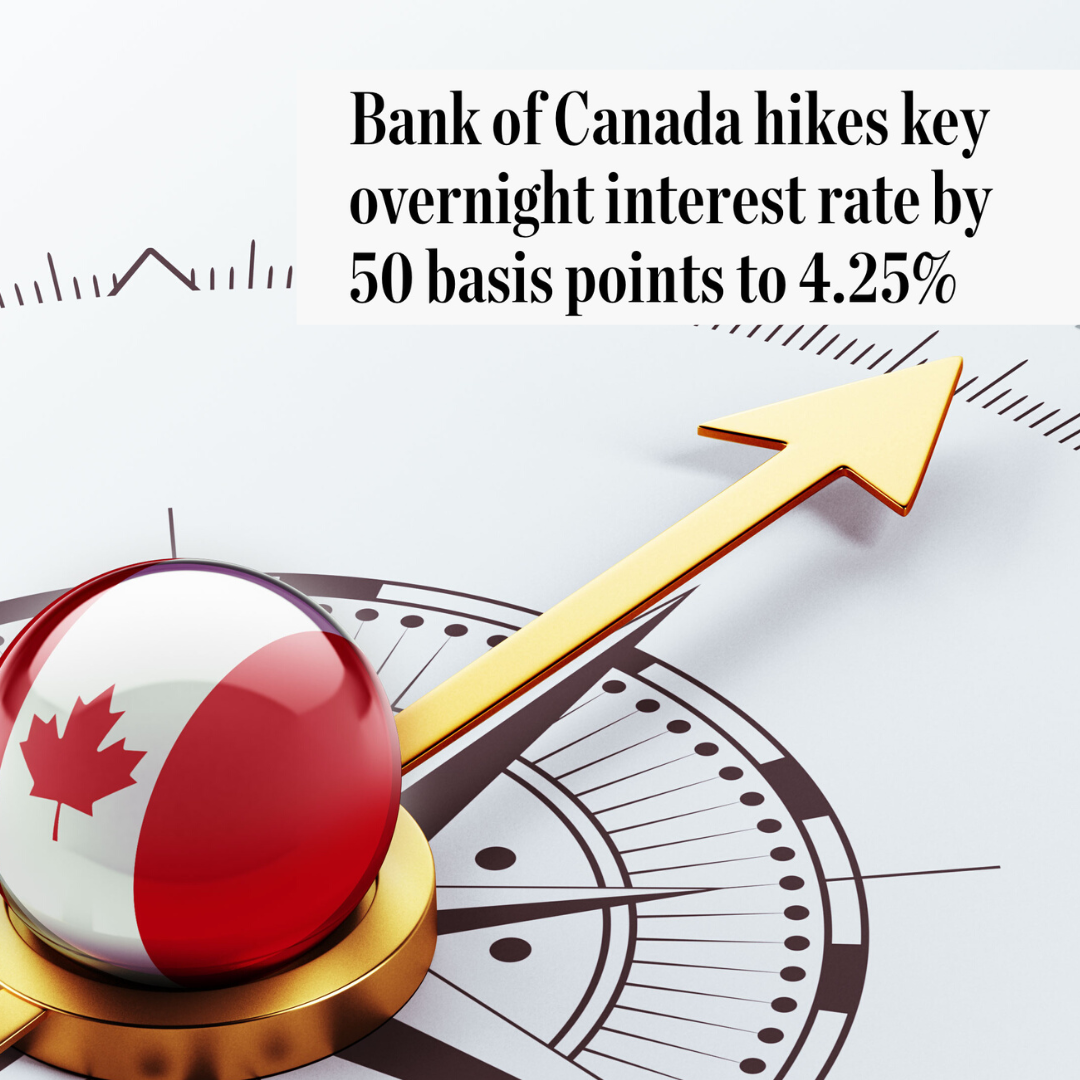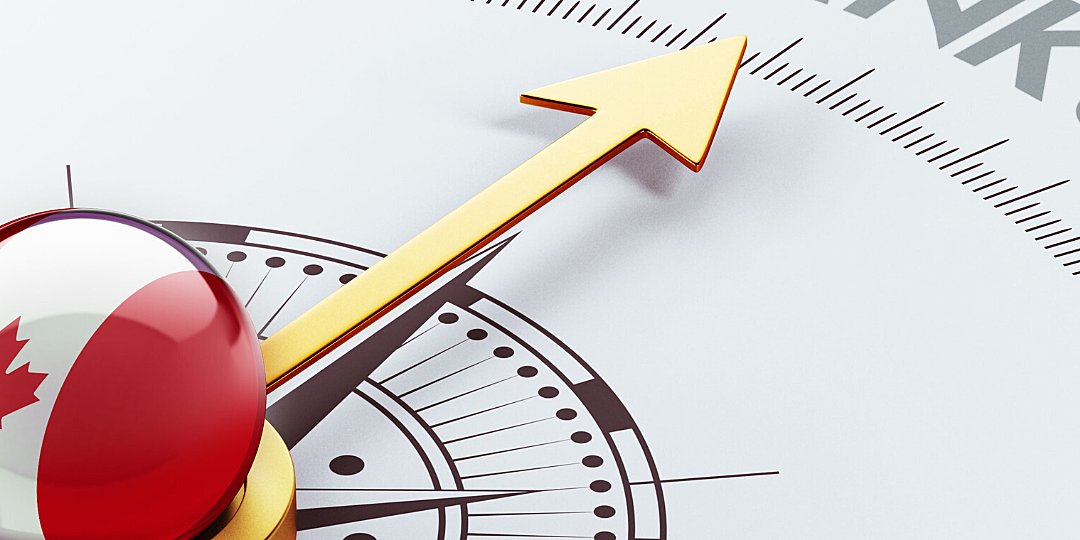
The Bank of Canada has just announced a 0.50% increase to their benchmark interest rate which now sits at 4.25%.
Early predictions were for a 0.25% rate hike while many economists shifted predictions in the past couple days to the 0.50% hike we see this morning. This will push the prime lending rate from 5.95% to 6.45% at most lenders. Note, TD has a different prime that will go from 6.10% to 6.60% - it's complicated!
A few things to note:
A few things to note:
1. This is the 7th rate hike we have seen this year. This increase today is in the same amount we saw with the previous rate hike on Oct 26th. The next rate announcement comes on Jan 25th, 2023.
2. In their words today, “Overall, the data since the October MPR support the Bank’s outlook that growth will essentially stall through the end of this year and the first half of next year.” “Looking ahead, Governing Council will be considering whether the policy interest rate needs to rise further to bring supply and demand back into balance and return inflation to target.”
3. The increase will see payments rise for variable rate clients by about $30/mo for every $100,000 owing. Those with a HELOC will also see the 0.50% increase in rate. No impact to fixed rate clients. Example: if your balance is $650,000, the payment will increase $30 x 6.5= $198/mo or $97.50 if paying bi-weekly.
4. The short term pain of rate hikes will hopefully lead to a long term gain as inflation comes down and rates then decrease. Inflation currently sits at 6.9%, down from its June peak of 8.1%. The goal is to have inflation at 2%. There is sentiment that rates will level thru 2023 and then come down again in 2024. I would not be surprised to see one more increase of 0.25% before the rates level.
5. Not all lenders will auto-increase the payment. The big 6 banks ( and some credit unions ) aside from Scotia all have a set payment variable - they will not auto-increase. They give the client the benefit of keeping the payment the same, but more goes to interest so it takes longer to pay it off which results in a higher amortization at renewal time and more interest being paid overall. The client can increase on their own if they wish.
6. Most of those with a "static payment or fixed payment" variable rate may have to make payments towards principal on their mortgage now as they cross their "trigger rate" or "trigger point". This applies to all major bank mortgages ( aside from Scotia ) and some credit unions as well. As of this change today the total payment increase ( after 7 rates hikes of total 3.95% ) on these types of mortgages should be approximately $245/mo higher for every $100,000 owing.
7. New and existing pre-approvals will be subject to the rate change, thus impacting the qualifying amount on variable rate mortgages. We now have variable rates that are higher than fixed rates. While this announcement only directly impacts variable rates, bond yields ( the main indicator for fixed rates ) have been dropping which may lead to lowering of fixed rates shortly.
8. Lenders will shortly make announcements to their updated prime rates. Payment changes ( for lenders that are adjustable ) usually happen within the next couple scheduled payments.
9. There is talk going around about these hikes leading us to a recessionary period that could see rates come back down once inflation is curbed. Historically speaking the variable rates have outperformed fixed rates, however we are in unprecedented times and now see variable rates higher that fixed in some cases. While mortgages are the largest debts people have, many will have to look to spend less where possible in other areas to make room for the payment increases. Refinancing has also been an option to some with a lower amortization remaining to consolidate some other high interest debts into their mortgage.
As per their announcement today, "Governing Council continues to assess how tighter monetary policy is working to slow demand, how supply challenges are resolving, and how inflation and inflation expectations are responding. Quantitative tightening is complementing increases in the policy rate. We are resolute in our commitment to achieving the 2% inflation target and restoring price stability for Canadians.”
10. Mortgage rates/payments today will be approximately like below for owner occupied properties - Based on very general rates, some lenders may have promo specials.
Variable ( insured - less than 20% down ) - 5.50%.
Works out to about $610/ $100,000 mortgage on a 25 year Amortization which is the max for insured.
Works out to about $610/ $100,000 mortgage on a 25 year Amortization which is the max for insured.
Variable ( uninsured - 20% or more down ) – 6.05%.
Works out to about $598/ $100,000 mortgage on a 30 year Amortization which is the max for uninsured.
Works out to about $598/ $100,000 mortgage on a 30 year Amortization which is the max for uninsured.
5 year Fixed ( insured - less than 20% down ) – 4.99%.
Works out to about $581/ $100,000 mortgage on a 25 year Amortization which is the max for insured.
Works out to about $581/ $100,000 mortgage on a 25 year Amortization which is the max for insured.
5 year Fixed ( uninsured - 20% or more down ) - 5.54%.
Works out to about $566/ $100,000 mortgage on a 30 year Amortization which is the max for uninsured.
Works out to about $566/ $100,000 mortgage on a 30 year Amortization which is the max for uninsured.
11. Shorter term fixed rates are back in style. We have been seeing many clients interested in looking at a 1, 2 or 3 year fixed rates while the dust settles on the variable side. Then, if rates on the variable side come back down as expected, they can catch the variable on the way down towards the end of what would have been a 5-year term.
12. What can current variable rate clients do? There is always an option to convert to a fixed rate with their current lender, or contact your Mortgage Broker to look at other lower rate fixed options to switch to – it can make sense even after a penalty in some cases.
You can look to refinance to a longer amortization to lower their payments or consolidate other high interest debt. If paying weekly or bi-weekly, they can go to monthly to save a couple payments per year. They can go from accelerated to non-accelerated payments.
You can look to refinance to a longer amortization to lower their payments or consolidate other high interest debt. If paying weekly or bi-weekly, they can go to monthly to save a couple payments per year. They can go from accelerated to non-accelerated payments.
You can read the full Bank of Canada release here.
Commonly asked questions by Mortgage Broker Zaheed Valli-Hasham (Senior Mortgage Broker | City Wide Mortgage Services):
What is the impact of the increase to your variable rate mortgage?
The 0.50% increase will increase your mortgage by approximately $30 for every $100,000 that you owe. As an example, if your mortgage balance is $525,000 that would be $30 x 5.25 = a $157.50/month increase to your payment, or $78.75 if paying bi-weekly.
What are the key points from the announcement?
As per their announcement today, “Overall, the data since the October MPR support the Bank’s outlook that growth will essentially stall through the end of this year and the first half of next year.”
“Looking ahead, Governing Council will be considering whether the policy interest rate needs to rise further to bring supply and demand back into balance and return inflation to target."
“Looking ahead, Governing Council will be considering whether the policy interest rate needs to rise further to bring supply and demand back into balance and return inflation to target."
When is the next rate announcement?
The next Bank of Canada announcement is on Jan 25th, 2023.
Should you convert/lock in to a fixed rate?
While you do have the option to “lock in” to a fixed rate, the rate your lender will offer you will be dependent on the remaining term of your mortgage and what their current rates are for that term. This may not be ideal if you are given the option to lock into a longer term fixed. There is speculation that variable rates will come back down in the next 2 years and you may not be able to take advantage of that. However, if peace of mind prevails for you, then it would be an available option to lock in.
Depending on the time left on your mortgage, you may also have the option to go with a shorter fixed term til variable rates settle again.
What can you do going forward?
If you are comfortable to increase your current payments that would be a suggestion to reduce the impact to you when rates climb and to also take advantage of the low rate you have. Your mortgage does allow for this. By doing so, you would be paying off more of the principal as 100% of any payment increase goes towards that and not to interest.
Another option discussed was looking to increase your payment to match what a fixed rate would be. Contact your mortgage broker to assist you in the calculation if you wanted to increase the amount.
Also, If you are paying weekly or bi-weekly, you can ask your lender to change your payments to monthly, which would save you from making a couple payments per year.
Another option discussed was looking to increase your payment to match what a fixed rate would be. Contact your mortgage broker to assist you in the calculation if you wanted to increase the amount.
Also, If you are paying weekly or bi-weekly, you can ask your lender to change your payments to monthly, which would save you from making a couple payments per year.
If cash flow and making the payments is a concern, you could look to consolidate any other high interest debt you may have into a new mortgage so that you have a lower rate compared to credit card, loan or line of credit interest - and also a lower monthly overall payment.
What can I do if I am finding it difficult to manage my increased payments?
If you are paying weekly or bi-weekly, you can ask your lender to change your payments to monthly, which would save you from making a couple payments per year. I only suggest this if your mortgage has an adjusting payment. If you are in a static payment variable and request this change, it may trigger you needing to pay the full current amount.
Depending on the amortization remaining on your mortgage, there may also be an option to refinance your mortgage to a longer amortization which in turn can lower your payments. This option would increase the time needed to pay it down but help out with a lower payment for now. You can then go ahead and increase your payments when comfortable to do so, if you wish.
This will mainly apply if you started with a 25 year amortization, and you can look to go to 30 years. It would require to re-qualify the mortgage and there would be a small penalty to exit your current mortgage. We can include this penalty in the new mortgage so it's not paid in cash. The rate would also be based on today's variable rates.
This will mainly apply if you started with a 25 year amortization, and you can look to go to 30 years. It would require to re-qualify the mortgage and there would be a small penalty to exit your current mortgage. We can include this penalty in the new mortgage so it's not paid in cash. The rate would also be based on today's variable rates.
My current mortgage is adjustable, can I change my mortgage to a variable mortgage that won't change payments?
Most lenders will change the payments when interest rates change. There are a couple of lenders that have a variable rate mortgage in which the payment amounts won't change. However, since they don't change, the length of your mortgage ( amortization ) will increase as more of your payment goes towards interest and not paying down the principal.
You would have to move your mortgage to a lender that offers this and that would incur a small penalty to leave your existing mortgage, and then re-qualify for a new mortgage with the penalty included so it's not paid in cash. The rate would also be based on today's rates. This option is a suggestion for those who are finding it a bit tight on a monthly basis to make the payments with the recent increases.
Keep in mind that even with these types of mortgages, if rates continue to rise, the bank may ask you to make payments. This would be if it got to a point where all your payment was going towards interest.
Keep in mind that even with these types of mortgages, if rates continue to rise, the bank may ask you to make payments. This would be if it got to a point where all your payment was going towards interest.
My current mortgage has a static/fixed variable rate payment, what is the impact?
As difficult as it may be financially, I do suggest to manually increase your payment to what is possible based on your situation. This change would need to be requested directly with lender. VERY IMPORTANT - if you are going to make an increase now, be sure to make it via the LUMP SUM privilege, and not via the PAYMENT INCREASE privilege. If you end up doing it via the payment increase privilege they will set the new payment to what is should be based on your amortization which would be a big increase. If you make it via the LUMP SUM, then they won't change the base payment, but just apply the lump sum towards the principal. Happy to help you with this if needed, just reach out!
You may hear from your lender if the payment you are making is just paying interest ( trigger rate ), the lender may require you to make additional lump sum payments so that there is a principal reduction. This "trigger rate" would be in the mortgage documents you signed at notary/lawyer office and they should have provided you with a copy. Also, if you are not making additional payments, the amount owing will be added to your balance, which can result in reaching the "trigger point". This is when your balance passes the original amount you borrowed. Furthermore, at renewal time, the payment then would be based on a higher balance with a lower amortization. This could result in a higher default payment at renewal time.
If we are looking to buy, will my approval amount change?
Yes, as rates go up, the stress test required to qualify for a mortgage will also increase. This means that due to a higher payment, the qualifying amount will lower.
For any mortgage questions contact Zaheed Valli-Hasham (Senior Mortgage Broker | City Wide Mortgage Services)
or Contact me today for all other questions or needing assistance:
Email: lmoyo@rennie.com
Mobile: 778-228-7918
Instagram: @lizamarierealty
Facebook: Liza Marie Moyo Real Estate
Vimeo: Liza Marie Moyo Real Estate
For any mortgage questions contact Zaheed Valli-Hasham (Senior Mortgage Broker | City Wide Mortgage Services)
or Contact me today for all other questions or needing assistance:
Email: lmoyo@rennie.com
Mobile: 778-228-7918
Instagram: @lizamarierealty
Facebook: Liza Marie Moyo Real Estate
Vimeo: Liza Marie Moyo Real Estate

